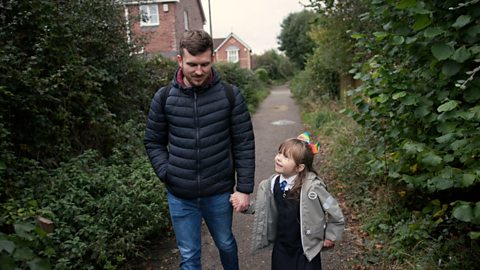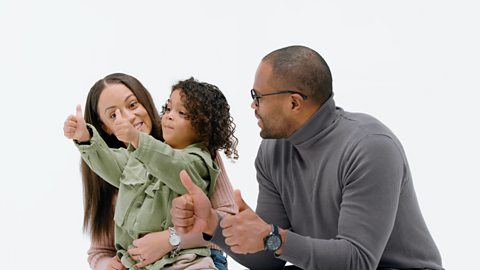Phonological awareness is the understanding that spoken words are made up of sounds and recognising how they come together to form words.
Children usually develop this skill at around 4 or 5 years old, and it's really important when learning to read.
We caught up with Early Years Practitioner Jamel Campbell to chat about phonological awareness and find out how you can best help your child's reading and communication skills.
At around four to five years old, children start to realise that words are made up of smaller sounds.
This is called phonological awareness. To learn to read, children need to develop an awareness of the very smallest sounds in words.
So for the word 'bat' there are three short sounds, or phonemes that make up the word, which are b-a-t. Bat.
Using the short sounds rather than the letters in the alphabet,B-A-T, really helps with their reading.b-a-t.
Keep sounding out words this way, to help your child's reading and communication skills. Check out my film with more tips to support phonological awareness, to find out more.
What is a phoneme?
A phoneme is the smallest unit of sound that makes up a word.
For example, the word 'bat' is made up of three small sounds or phonemes. They are b-a-t.
Phonemes are the building blocks of language and are an essential part of learning to read and write.
Using these short sounds rather than the letters in the alphabet really helps with their reading. It's more useful to know the sounds letters make when you're reading because that helps children blend them together to make the word.
Learning the alphabet will come later at school once they've mastered this skill.
Keep sounding out words using letter sounds to help your child's reading and communication skills. Check out the Alphablocks guide to phonics for a breakdown of all the different letter sounds.
Examples of phonological awareness
Some of the skills associated with phonological awareness are:
- Identifying words that rhyme.
- Clapping out the number of syllables in a word.
- Recognising words with the same starting letter sounds. Ball and baby both have b at the beginning.
- Saying the first or last sound in a word. The beginning sound of fox is f.
- Combining the separate sounds in a word to say the word. For example, c-a-t makes cat.
Spotting the sounds in words and pointing out rhymes is not only great fun, but it helps to build phonological awareness that can help with their reading and communication skills.
A game like 'what can we see?' helps them think about the sounds that certain words start with.
I can see something that begins with 'b'. b. What can you see that begins with 'b'? Bear. That's good. What in here begins with 'b'?Look around…b…Ball. Good boy.
Encouraging him to say the words out loud is really good practice for speech development and helps with reading and writing too.
Something beginning with 'c'. Car. There's a car! Brilliant! That's brilliant. Well done.
Pointing out rhymes will help Zak recognise that certain words sound the same. Try reading a rhyming book you know well together and ask Zak to fill in the gaps.
It's the evening now and time for bed, a chance to rest his tired…Head. Head. Bed and head! Yeah, bed and head. They sound the same.
So how does rhyming help Zak learn new words? The rhyme 'watch out dog, don't fall off the log adds emphasis to the word 'log' which may be a new word for Zak, which makes it easier for him to learn.
Read your favourite books often, so you get to know them really well. Try saying the first sound in a word, and then Zak, if you try to finish the word.
Jack has a pet 'c'…c…Cat! Brilliant. By doing this, you're highlighting the sounds in the word, reinforcing them and making it easier for Zak to pick up the next time you read the book together.
If we're concentrating on the sounds of the words, does that mean we shouldn't teach the alphabet using the ABCs?
It's more useful to know the sounds the letters make when you're reading, because that helps them to blend them together to make the word. For example, b-a-t makes bat, but B-A-T makes B-A-T. b-a-t. b-a-t. Bat. Very good!
Keep sounding out words and pointing out rhymes to help your child's reading and communication skills.
Top tips for building phonological awareness
Games like I spy or sound treasure hunt helps children think about the sounds that words start with.
Encouraging children to say the words out loud as you play is really good practice for speech development and helps with reading and writing too.
Why not try a game of hopscotch using letters instead of numbers? Or create a sound sorting box to help group similar starting phonemes together.






